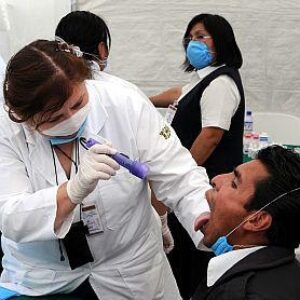
Flu Activity Continues to Rise in Spokane County; Vaccination is Best Protection
For more information, contact Kim Papich, SRHD Public Information Officer (509) 324-1539 or kpapich@srhd.org
SPOKANE, Wash. – Flu activity continues to increase in Spokane County, claiming the life of a local adult this week—Eastern Washington’s first flu-related death this season. The unvaccinated woman was in her 70s and also had underlying health conditions.
"Unfortunately, this is an example of how serious flu can be," said Dr. Bob Lutz, Spokane Regional Health District’s health officer. “Your best chance at protecting yourself and others is to get a flu shot soon.”
The flu is a contagious respiratory illness caused by viruses that infect the nose, throat and lungs. Some people, such as those over the age of 65, young children, pregnant women, American Indian/Alaska Natives and those with certain health conditions, are at higher risk for serious flu complications.
One other flu-related death occurred in Washington state this season, in Pierce County, as reported by Washington State Department of Health. Fourteen Spokane County residents have been hospitalized with flu this season, compared to 10 admissions during the same period last year. Flu season in Spokane County typically peaks in February.
People who have the flu often feel some or all of these symptoms:
- Fever or chills
- Cough
- Sore throat
- Runny or stuffy nose
- Muscle or body aches
- Headaches
- Extreme fatigue (very tired)
Flu vaccines are designed to protect against the most common flu viruses. Centers for Disease Control and Prevention (CDC) recommends everyone 6 months of age and older get immunized against flu. The vaccine promotes antibody protection within two weeks.
Flu shots are available at numerous locations throughout Spokane County, including healthcare provider offices, local pharmacies and grocery stores.
Flu vaccine choices this year include:
- Trivalent vaccine The traditional vaccine designed to protect against three different flu viruses—two A viruses and one B virus.
- Quadrivalent vaccine These flu vaccines protect against four strains of influenza—two strains of influenza A and two strains of influenza B. Including a second strain of influenza B provides broader protection.
- High-dose vaccines As people age, their immune systems weaken, which means the elderly benefit less from a standard flu shot. High-dose shots, approved for those ages 65 and over, include four times the usual level of immunity-producing proteins to provide more protection.
- Nasal spray flu vaccine For use in non-pregnant individuals, 2 years through 49 years of age.
Said Dr. Lutz, “For decades, we only had one type of flu vaccine. By giving people choices, we remove some of the barriers that prevent vaccination. Since some vaccines are intended for certain groups, talk to your provider or pharmacist about the vaccine that is best for you.”
Last flu season, 616 people were hospitalized due to flu in Spokane County and, unfortunately, 41 deaths were attributed to flu-related complications. Approximately two-thirds of those hospitalized and those who died were unvaccinated. According to CDC, flu killed more people, about 80,000 individuals, in the United States last winter than any other seasonal influenza in decades.
For more information about influenza and influenza vaccine visit cdc.gov/flu or srhd.org. Spokane Regional Health District’s web site also offers comprehensive, updated information about Spokane Regional Health District and its triumphs in making Spokane a safer and healthier community. Become a fan of SRHD on Facebook to receive local safety and wellness tips. You can also follow us on Twitter @spokanehealth.
###

